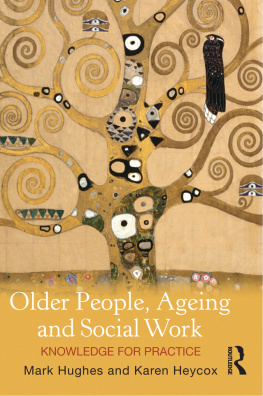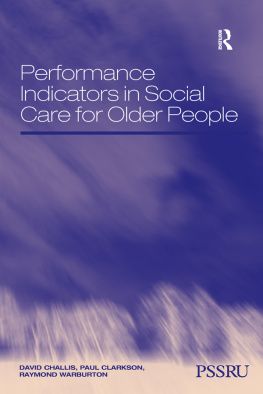Politics and Old Age
Two weddings and a baby
Politics and Old Age
Older citizens and political processes in Britain
John A. Vincent, Guy Patterson and Karen Wale
School of Historical, Political and Sociological Studies ,
University of Exeter, UK
First published 2001 by Ashgate Publishing
Reissued 2018 by Routledge
2 Park Square, Milton Park, Abingdon, Oxon OX14 4RN
711 Third Avenue, New York, NY 10017, USA
Routledge is an imprint of the Taylor & Francis Group, an informa business
Copyright John A. Vincent, Guy Patterson and Karen Wale 2001
All rights reserved. No part of this book may be reprinted or reproduced or utilised in any form or by any electronic, mechanical, or other means, now known or hereafter invented, including photocopying and recording, or in any information storage or retrieval system, without permission in writing from the publishers.
Notice:
Product or corporate names may be trademarks or registered trademarks, and are used only for identification and explanation without intent to infringe.
Publisher's Note
The publisher has gone to great lengths to ensure the quality of this reprint but points out that some imperfections in the original copies may be apparent.
Disclaimer
The publisher has made every effort to trace copyright holders and welcomes correspondence from those they have been unable to contact.
A Library of Congress record exists under LC control number: 2001093299
ISBN 13: 978-1-138-73319-0 (hbk)
ISBN 13: 978-1-315-18779-2 (ebk)
The authors would like gratefully to acknowledge the help of the Leverhulme Trust, which provided the grant to enable our research project to proceed. We acknowledge the help of the ESRC Data Archive and those researchers who have deposited with the archive surveys that we have used for our research. Their names are detailed in the Bibliography. Our thanks to the staff at MORI who helped us conduct our own survey and to Gail Prosser who copy-edited the manuscript. Sarah Vincent, Peter Smith and John Miles also made helpful comments and suggestions about the book
Most particularly we wish to express our sincere thanks to the many people from all walks of life who gave their time to assist us and allowed us to interview them. Without their cooperation the book would not have been written.
- ABI Association of British Insurers
- AGM Annual General Meeting
- ARP/Q50 Association of Retired People and Those over Fifty
- BEM Black and Ethnic Minority Elders' Working Group
- BES British Election Survey
- BGOP Better Government for Older People
- BPTUAA British Pensioners' Trade Union Action Association
- DSS Department of Social Security
- EDM Early Day Motion
- EU European Union
- GLC Greater London Council
- GLF Greater London Forum for the Elderly
- GMB General, Municipal and Boilermakers Union
- IMG Inter-Ministerial Group
- MEBESA Minority Ethnic Black Elders Strategic Alliance
- MEP Member of the European Parliament
- MIG Minimum Income Guarantee
- MP Member of Parliament
- NAPF National Association of Pension Funds
- NFOAPA National Federation of Old Age Pensions Associations
- NHS National Health Service
- NPC National Pensioners' Convention
- NUM National Union of Mineworkers
- NUPE National Union of Public Employees
- NUR National Union of Railwaymen
- OPCS Office of Population Census and Surveys
- OPPOL Older People and Politics Project
- PAYG Pay as You Go
- PRC Pensioners' Rights Campaign
- SERPS State Earnings Related Pension Scheme
- TGWU Transport and General Workers Union
- TUC Trade Union Congress
- UK United Kingdom
- US, USA United States of America
- VAT Value Added Tax
The Issue
Older people have been characterised by two mutually contradictory stereotypes. On the one hand they have been portrayed as a powerful lobby, growing demographically and able to demand large redistributions of the nation's income in their direction. On the other hand they have been typified as a marginalised group at high risk of poverty and exclusion and, in a political context, largely powerless. This book examines, using original research, the reality of the impact of the increasing number of older people on the British political process.
The Project
The primary purpose of this book is to present and discuss the significance of the findings of a major piece of research conducted by the Older People and Politics Project (OPPOL) within Exeter University's Sociology Department. The project had three mam investigative concerns:
- How effective are pressure groups and lobbyists for older people?
- How is the power and influence of older people perceived by older people themselves and the general public?
- How are politicians responding to older people and their needs?
The project drew on a wide variety of techniques and sources to assemble data. The team researched documentary sources relating to older people's politics in general and the 1997 General Election in particular. Over a twelve-month period from May 1999 to May 2000 interviews were conducted with politicians from the three major political parties, who were identified first by their position within the party, second by their involvement with older people's issues and third by their willingness to discuss the issues. Key figures from the major charities working on behalf of older people and activists within the pensioners' movement were also interviewed. The opinions of the general public were obtained from focus groups and individual interviews held with a wide range of people. The focus groups looked at how the power and influence of older people is perceived by older people themselves and by the general public. Focus
Members of the research team also observed and participated in a wide range of events and activities through which older people's interests were expressed. These included forums, public meetings, committee meetings and rallies. We attended Age Concern 'Millennium Debate of the Age' events, including the final conferences in London; the Better Government for Older People (BGOP) Learning Network Event, 25 June 1999; National Pensioners' Convention (NPC) educational weekends; National Pensioners' Convention (NPC) Full Council Meetings; a British Pensioners' Trade Union Action Association (BPTUAA) General Purpose and Finances Meeting; a Greater London Pensioners' Association Rally; a Pensioners' Rights Campaign Rally, the Greater London Forum for the Elderly's AGM; a meeting of the Flackney Pensioners' Convention; the Pensioners' Voice AGM; the Pensioners' Day March of 1999; and Pensioners' Parliament of May 2000
Background to the Issues
Defining Old Age
Old age may be defined in many ways. Chronological age is the most obvious choice. Older adults might be thought of as being over 55, or perhaps as over 65. Alternatively, they might be defined in relation to employment, as retired people. Old age has also come to be defined through a political context. As retired people are generally entitled to receive some sort of state pension, age becomes 'a politically important characteristic since pension systems are a direct result of political decisions about how surplus wealth will be redistributed' (Quadagno and Street, 1996:378). The establishment of old age pensions systems created chronological definitions of old age based on retirement from work. Older people are simultaneously thought to be those who have retired from work and those over the legal retirement age (60 for women, 65 for men). However, these two critena coincide less and less. Old age can also be defined by family cycle, for example through reference to godparenthood. It might even be defined through some self-assessment of health or frailty feeling 'old'.






